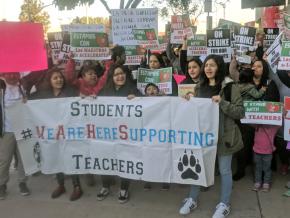These LA teachers are still on the picket line
and report from the picket line in Los Angeles about the high stakes in a historic strike by teachers against a charter school operator.
AS EDUCATORS around Los Angeles celebrate the victorious end to their strike in the country’s second-largest school district — an epic battle that captured attention around the world — a part of that struggle is continuing on a sunny sidewalk in South Los Angeles.
Teachers at Accelerated Schools, three charter campuses that offer K-12 education, are continuing a strike that began in conjunction with the walkout by United Teachers Los Angeles (UTLA) members against the Los Angeles Unified School District (LAUSD).
Though Accelerated educators are also represented by UTLA, their negotiations are ocurring separately from those of public-school educators. Until an agreement is reached, teachers and community members are continuing to walk the picket line in this first-ever charter school strike in California.
“While the LAUSD strike that had over 30,000 folks out on the street fighting for basic common-sense demands is over,” UTLA President Alex Caputo-Pearl said on the picket line, “the strike here at Accelerated is not, and we’re going to put every bit of our power and influence here to support the educators, the parents, the students.”

Negotiations between educators and the school’s Board of Trustees began in April 2017. Bargaining has gone through periods of mediation, fact-finding and ultimately impasse after the administration failed to implement the recommendations of the state-appointed fact-finder.
After 21 months of failed negotiations, teachers — with the support of students, parents and other community members — began their historic strike on January 15.
At stake in bargaining are demands considered standard in education, including at other charter schools. They center on improving the working conditions for teachers in schools where only 77 teachers work in all, yet where 85 teachers have left over the last nine years.
The three primary demands include the implementation of a binding arbitration agreement, a due process of firing agreement and the improvement of health care benefits. Accelerated educators view these as necessary for ensuring a healthy work environment where they can remain a stable presence in the lives of their students
Despite overwhelming support for the strike from the local community, school officials have called the police on a solidarity picket that included teachers, parents and their students. They have also threatened to shut down the school entirely if teachers do not drop their demands.
Many of the striking teachers have concluded that Accelerated administrators aren’t interested in bargaining in good faith, but rather demoralizing the striking teachers. The administration’s behavior has solidified their determination to fight on behalf of themselves and their students.
EDUCATORS HAVE been at the front of the recent uptick in struggle in the U.S. labor movement.
After decades of encroaching neoliberalism and attempts at privatization, the Chicago Teachers Union went on strike in 2012, seeking reduced standardized testing, fully funded schools and smaller class sizes. Seattle teachers followed suit in 2015, including the emphasis on social justice issues.
Since the start of 2018, a wave of teacher strikes has spread around the country. It started in the “red states” of West Virginia, Oklahoma, Arizona and Kentucky and continued this fall in Washington state and, now, Los Angeles. The end of 2018 also saw the first charter school strike in U.S. history in Chicago at the Acero network — and it won, too.
There are many sources of instability in the lives of students in the largely working-class community in which the Accelerated Schools are located. Teachers are often one of the few steady presences in the lives of their students.
This factor is helping fuel the determination of striking teachers — who note that teacher turnover at Accelerated exceeds 40 percent annually, due to both the unilateral firings and the increasingly substandard working conditions and benefits.
During earlier bargaining, teachers rejected a contract offer that failed to address two main causes of teacher turnover — lack of due process and binding arbitration, meaning that teachers can be summarily fired without cause. One teacher said a ninth-grade student told him that they were the only teacher still at the school from when the student started.
Striking teachers have received abundant support from students and parents alike, who recognize this as a fight for their community and walk the picket lines with educators and greet them in solidarity.
The teachers striking against Accelerated Schools are critical of practices such as a co-location of charters on public school campuses. Many acknowledge the problems of charter schools in privatizing the education of students — even while noting that the community is a primary factor for why they want to work there. One teacher, for example, said they were able to teach a gender studies class for high schoolers, a feat achieved at few public schools.
The bureaucratic and restrictive practices imposed on public-school teachers sometimes incentivize educators to seek a less alienating alternative at charter schools, even in the face of the increased exploitation that implies. At the end of the day, however, charter school teachers are also workers looking for more fulfilling and less exploitative jobs.
Charter school teachers share far more in common with their public-school counterparts than with the school boards that promote privatization. On the picket line, educators frequently contrasted their goal of helping students and serving the community with the Accelerated administrators’ goals of making a profit and maintaining a positive public image.
Striking teachers at the Accelerated Schools recognize the role that their wakout can play in bridging the gap between public and charter school educators. The strike against Accelerated Schools can add to the precedent set in Chicago about what it means to organize charter schools — and what it means to win.


